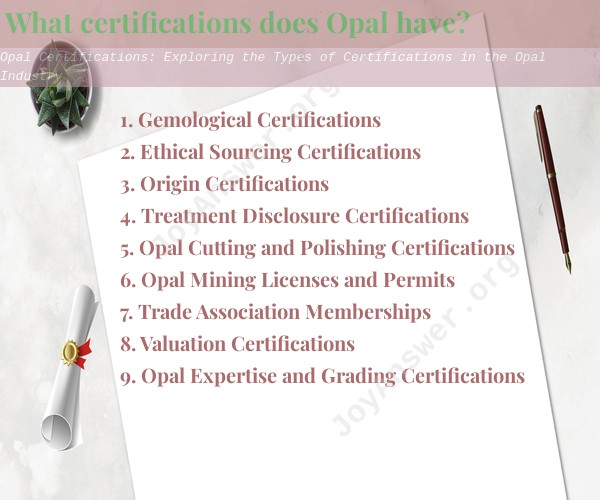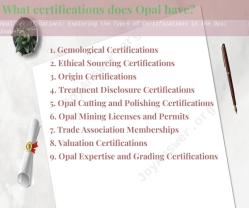What certifications does Opal have?
Opal certifications are essential in the Opal industry to ensure the authenticity, quality, and ethical sourcing of opals. Here are some types of certifications commonly found in the Opal industry:1. Gemological Certifications
Gemological certifications provide detailed information about the quality and characteristics of opal gemstones. These certifications are issued by gemological laboratories and include details about color, clarity, cut, and carat weight. They also confirm if the opal is natural or synthetic.
2. Ethical Sourcing Certifications
As the demand for responsibly sourced gemstones increases, ethical sourcing certifications have become crucial in the Opal industry. These certifications verify that the opals have been mined and traded without causing harm to the environment or violating human rights.
3. Origin Certifications
Origin certifications specify the exact geographic location where the opal was mined. Opals from different regions can have unique characteristics, and consumers often value knowing the origin of their gemstones.
4. Treatment Disclosure Certifications
Some opals undergo treatments to enhance their appearance or stability. Treatment disclosure certifications provide information about any enhancements or treatments that the opal has undergone, ensuring transparency for buyers.
5. Opal Cutting and Polishing Certifications
Opal cutting and polishing certifications are given to lapidaries who have demonstrated their skill in shaping and finishing opal gemstones. These certifications assure the quality of the cutting process and the final appearance of the opal.
6. Opal Mining Licenses and Permits
In regions where opal mining is regulated, individuals or companies engaged in mining opals must obtain proper licenses and permits. These certifications ensure compliance with local laws and regulations.
7. Trade Association Memberships
Opal traders and businesses may hold memberships in industry trade associations. Being a member of reputable associations indicates commitment to ethical practices and adherence to industry standards.
8. Valuation Certifications
Valuation certifications are provided by qualified appraisers who assess the value of opals based on various factors, including quality, rarity, and market demand. These certificates are useful for insurance purposes and investment considerations.
9. Opal Expertise and Grading Certifications
Opal experts may obtain grading certifications that demonstrate their proficiency in assessing opal quality. These certifications are valuable for buyers seeking advice and expertise from knowledgeable professionals.
It's important to note that the availability and specific types of opal certifications may vary depending on the country or region. Buyers and industry professionals should look for reputable certification providers and ensure that the certifications they receive are from recognized and reliable sources.



